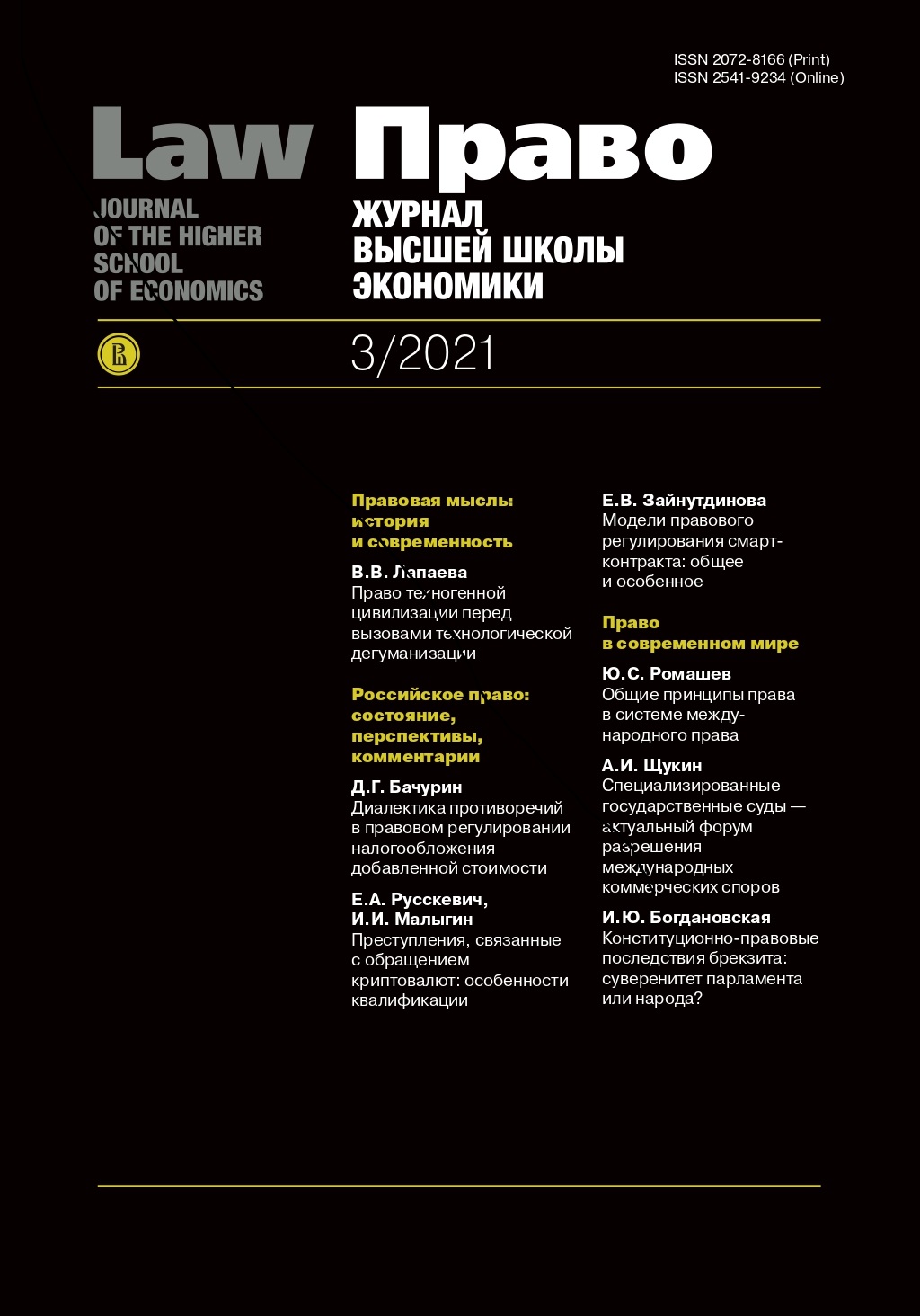Constitutional Law Consequences of Brexit: Sovereignty of Parliament or of People
Abstract
The exit of Great Britain from the European Union (Brexit) has actualized a lot of political, economic and legal issues. The latter issues include the relevant aspects of European law, as well as national, first of all, constitutional law. Constitutional aspects of Brexit touch, from one side, the theme of revising and renovating traditional principles, including parliamentary sovereignty principle, and from other side, emergence and development of new institutions like referendum. Indeed, the British referendum of 2016 about exit from the European Union has become a legal base for the Brexit procedure. The implementation of this procedure has demanded a solution to a number of doctrinal constitutional issues, first of all about the priority of people's sovereignty that was expressed at the referendum, and about the position of the British parliament. The principle of parliamentary sovereignty for centuries determined the specifics of constitutional institutions of that state. The institute of referendums historically was not accepted in Great Britain exactly as a reason of contradiction between principles of parliamentary supremacy and principle of direct popular voting. However, the practice of referendums took place in the United Kingdom since the end of 20th century, especially ones connected with entry of Britain in the European Union and with her exit from it, turned to be a reason for the British constitutional doctrine to research and clear once more a modern understanding of parliamentary supremacy principle. Even more important problem was to elaborate ways and means of coexistence of both principles. It was necessary to answer the following questions: if parliamentary supremacy still exists in its traditional meaning, or it has a sense to change content of that principle for inclusion of the people's sovereignty into the British constitutional law; what is correlation of parliamentary and people's sovereignty in modern law as a whole. Because of the traditional British legal continuity way, for sure, it was impossible to wait for a full refuse from parliamentary sovereignty principle in favor of the people's sovereignty. The compromise was reached at the stage of Brexit itself. As a consequence, we see that in the present time traditional parliamentary sovereignty principle is maintained, but in the same time contours of referendum institute development in the British constitutional law are designed.
References
Ahmed T., Fahey E. (ed.) (2019) Brexit Law, Justices and Injustices. London: University of London Press, 320 p.
Allan T.R. (1985) The Limits of Parliamentary Sovereignty. Public Law, Winter, p. 614.
Barnard C. (2019) So Long, Farewell, Auf Wiedersehen, Adieu: Brexit and the Charter of Fundamental Rights. Modern Law Review, vol. 82, p. 350.
Barnett A. (2016) Brexit has killed the sovereignty of Parliament. Available at: https://www.opendemocracy.net/anthony-barnet/brexit-has-killed-sovereignty-of-parliament (accessed: 06.07.2019)
Craig P. (2003) Constitutional Foundations, the Rule of Law and Supremacy. Public Law, Spring, p. 110.
Dalton P., Dexter R. (1976) The Constitutional Law. L.: Allen and Unwin, pp. 41-47.
Denning A. (1990) Introduction to the European Court of Justice: Judges or Policy Makers? London: Bruges Group, p. 48.
Dicey A. (1982) Introduction to the Study of Law of the Constitution. 8th ed. Indianapolis: University Press of America, pp. 46, 92.
Goldsworthy J. (1999) The Sovereignty of Parliament. History and Philosophy. Oxford: Oxford University Press, pp. 236-239.
Endicott T. (2016) Parliament and the Prerogative: From the Case of Proclamations to Miller. Policy Exchange. P. 23. Available at: https://policyexchange.org.uk/ (accessed: 06.07.2019)
Feldman D. (2013) The nature and significance of “constitutional” legislation 129 LQR 343.
Elliott M., Williams J., Young A. (eds.) The UK Constitution After Miller: Brexit and Beyond. Oxford: Hart Publishing, 2018.
Jennings I. (1954) The Law and the Constitution. London: Macmillan, pp. 136-153.
Hogg P. (2007) The Constitutional Law of Canada. 3rd ed. Toronto: McClelland and Stewart, p. 261.
Khabrieva T.Ya., Chirkin V.E. (2006) Theory of Modern Constitution. Moscow: Norma, p. 108 (in Russian)
Laws J. (2021) About the Constitutional Balance. Oxford: Hart House, p. 15.
Loughlin M. (2018) The British Constitution: Thoughts on the Cause of the Present Discontents. LSE Legal Studies Working Paper, no 2. Available at: https://ssrn.com/abstract=3129734 (accessed: 15.08.2021)
Qvortrup M. (1999) A.V. Dicey: The Referendum as the People's Veto. The History of Political Thought, vol. 20, no 3, p. 531.
Masterman R., Murray C. (2016) A House of Cards? UK Constitutional Law Association. Available at: https://ukconstitutionallaw.org/2016/07/04/roger-masterman-and-colin-murray-ahouse-of-cards/ (accessed: 12.06.2021)
Markakis M. (2019) Brexit and the EU Charter of Fundamental Rights. Public Law, vol. 82, pp. 82-101.
Murkens J.E.K. (2021) A Written Constitution: A Case Not Made. The Oxford Journal of Legal Studies.
Phillipson G. (2017) EU Law as an Agent of National Constitutional Change: Miller v Secretary of State for Exiting the European Union. Yearbook of European Law, no 1, p. 46.
Poole T. (2017) Devotion to Legalism: On the Brexit Case. The Modern Law Review, vol. 80, issue 4, pp. 696-710.
Somek A., Michael A., Wilkinson M. (2020) Unpopular Sovereignty? The Modern Law Review, vol. 83, issue 5, pp. 955-978.
Tumanov V.A. (ed.) (1983) Burzhuaznaya konstitutcia na sovremennom etape. Moscow: Nauka, 215 p. (in Russian)
Wade E., Phillips J. (1950) The Constitutional Law. Moscow: Inostrannaya literatura, p. 63 (in Russian)
Weill R. (2003) Dicey was not Diceyan. CLJ, vol. 62, p. 474.
Weill R. (2004) We the British People. Public Law, Winter, p. 405.
Copyright (c) 2021 Law Journal of the Higher School of Economics

This work is licensed under a Creative Commons Attribution-ShareAlike 4.0 International License.


















